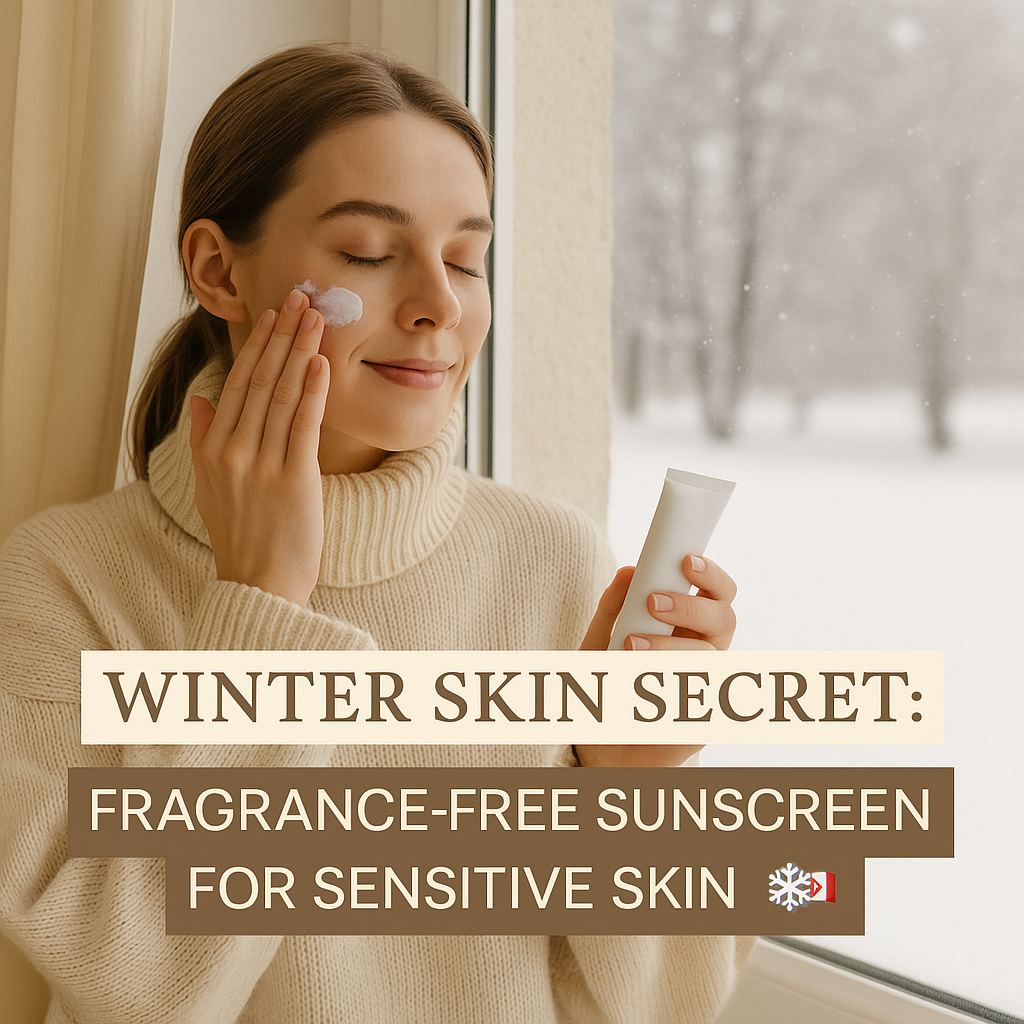If you’ve ever thought, “Why would I need sunscreen in winter?”, you’re not alone. Many Canadians (and even folks in the northern United States) pack away their SPF the moment the first snowflake falls. But here’s the truth: winter UV exposure can still harm your skin — and if you have sensitive skin, choosing the right sunscreen is more important than ever.
Let’s break down how to find the perfect fragrance-free sunscreen for sensitive skin that keeps your face happy all through the frosty months.
🧊 Why You Still Need Sunscreen in Winter
Even when the temperature dips below zero, UV rays don’t take a break. In fact, snow can reflect up to 80% of UV radiation, bouncing sunlight right back onto your skin. That means a bright winter morning can double your exposure, especially if you’re skiing, walking outdoors, or driving with the sun streaming in.
Meanwhile, indoor heating systems zap moisture from your skin, making it drier and more reactive. Add in cold winds and low humidity, and your sensitive skin becomes even more vulnerable.
That’s why a gentle, fragrance-free sunscreen is non-negotiable — even when your breath fogs up the air.
🌿 Why Fragrance-Free Sunscreens Are Better for Sensitive Skin
Fragrance (even “natural” or “essential oil” ones) can trigger redness, itching, or irritation, especially in dry winter conditions. Dermatologists often recommend fragrance-free formulas for people with eczema, rosacea, or easily reactive skin.
Look for sunscreens labeled “fragrance-free” and “for sensitive skin.” Don’t confuse “unscented” with “fragrance-free” — unscented products sometimes use masking agents that can still irritate the skin.
🧴 What to Look for in a Winter Sunscreen (Canada & U.S. Edition)
Here’s your checklist when picking a sunscreen that can survive harsh winters and gentle skin alike:
1. Mineral-Based (Physical) Sunscreen
Opt for zinc oxide or titanium dioxide sunscreens. These ingredients sit on top of your skin to reflect UV rays and are less likely to cause irritation compared to chemical filters.
2. Hydrating Ingredients
Cold air + indoor heating = dry skin disaster.
Choose sunscreens with ceramides, glycerin, or hyaluronic acid to lock in moisture.
3. Broad-Spectrum SPF 30 or Higher
Even in cloudy winter skies, UVA rays cause premature aging and sensitivity. Go for at least SPF 30.
4. Lightweight, Non-Greasy Texture
You want something that won’t pill under makeup or moisturizer. Look for “sheer finish” or “matte” versions if you prefer a smooth, everyday look.
5. Dermatologist-Tested & Non-Comedogenic
If your skin tends to react to everything, this label helps ensure fewer breakouts or allergic responses.
❄️ Extra Winter Skin Tips
- Moisturize first, then apply sunscreen as the last step in your morning skincare routine.
- Reapply every 2–3 hours if you’re outdoors or near windows.
- Use a humidifier indoors to fight off heating-related dryness.
- Avoid over-exfoliating during winter — let your skin barrier stay strong.
- Don’t skip your lips and ears — they can burn too!
💡 Dermatologist-Recommended Fragrance-Free Sunscreens
Here are a few fragrance-free sunscreens that get top marks for sensitive skin in cold climates (available across Canada and the U.S.):
- La Roche-Posay Anthelios Mineral SPF 50 — lightweight, non-irritating, and hydrating.
- CeraVe Hydrating Mineral Sunscreen SPF 30 — infused with ceramides and niacinamide for barrier support.
- EltaMD UV Clear Broad-Spectrum SPF 46 — gentle, lightweight, and beloved by dermatologists.
- Aveeno Protect + Hydrate SPF 50 — fragrance-free with oat extract to calm redness.
